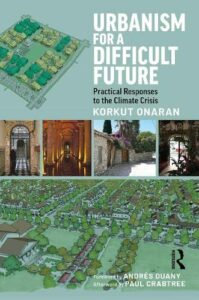Book Review: An Impressive Civic Gesture
By Korkut Onaran, Ph.D.
Editor’s Note: Author Korkut Onaran is an urban architect with a broad knowledge of development codes and regulation cultures, a subject he has explored extensively through his practice, teaching and research. Recently, Korkut has been exploring practical ways of creating resilient communities in the face of climate crisis, which he discusses in his new book, “Urbanism for a Difficult Future: Practical Responses to the Climate Crisis,” a much-needed guide to launching the next generation of land use planning and urbanism that will enable us to adapt to and survive the consequences of climate change.
Urbanism For a Difficult Future: Practical Responses to the Climate Crisis is a critical book that provides clear and realistic policy recommendations to increase the resilience of our communities in the face of climate disasters. The book makes a case for federal and state-level initiatives to enable localization. It demonstrates how to secure systems that sustain life (energy, water, food, waste and production of essential goods) as well as administrative and social protocols. It also provides the design principles for creating a built environment that will enable the kind of localization necessary for adaptation.
While I authored the book, the ideas presented in it were developed in collaboration with architect, urban planner and founder of the Congress for the New Urbanism (CNU), Andrés Duany (who authored the preface for the book), and civil engineer Paul Crabtree (who wrote the afterword for the book). As part of the book development process, there were many brainstorming sessions with like-minded urbanists – via workshops, meetings and virtually. As such, I dare to say, it is an important book about our future – it uncovers how to enable people to be creative, productive and supportive at local levels so that we can achieve strong and diverse local economies that can sustain life.
The Vinyl Siding Institute (VSI), the trade association for manufacturers of vinyl and other polymeric siding and suppliers to the industry, generously provided the funding for this book. And it’s not the first time I’ve had the opportunity to collaborate with VSI. Previously, we worked together on another book I co-authored, Architectural Design for Traditional Neighborhoods, with VSI consultant Fernando Pages, founding partner of Pel-Ona Architects & Urbanists, Ronnie Pelusio, and architect Tom Lyon. This helpful resource features solid arguments for the appropriate use of polymeric materials in traditional neighborhoods and supports the right kind of urbanism and place-making.
My personal motivation for writing Urbanism for a Difficult Future: Practical Responses to the Climate Crisis was to help pay it forward. Throughout my career, I have received an excellent education focused on architecture and environmental studies and have been presented with numerous opportunities to work on projects that I feel passionate about and support. I’ve also learned a lot and developed my ability to comprehend complex societal, financial and spatial systems. This book is my way of paying back. In it, we offer practical solutions for adaptation; to make our communities more resilient.
We need help generating awareness about this new book, with hopes of reaching the ears of the decision-makers, legislators and politicians. We started marketing the new book earlier this month at CNU’s 31st annual gathering in Charlotte, NC. Andrés and I presented the book and shared highlights, and the event was well-attended and well-received. Fernando, who helped promote the event, introduced us and thanked VSI for supporting the book’s creation. Furthermore, VSI distributed free copies of the book to attendees.
As I noted above, my motivation for developing this book can be categorized as a civic contribution. I feel honored to be on the stage with VSI in this important effort. Thank you to Fernando, VSI Vice President Matt Dobson, and VSI Senior Advocacy Director Alex Fernandez, for giving me this space to promote the book and express my gratitude.
About Korkut Onaran, Ph.D.
Korkut Onaran, Ph.D., co-owns Pel-Ona Architects and Urbanists with his business partner Ronnie Pelusio, (www.Pel-Ona.com). He is also an adjunct faculty member at the College Of Architecture And Planning, University Of Colorado At Denver. For a sample legislation reform proposal addressing the climate crisis, please visit www.hyperlocalurbanism.com.
